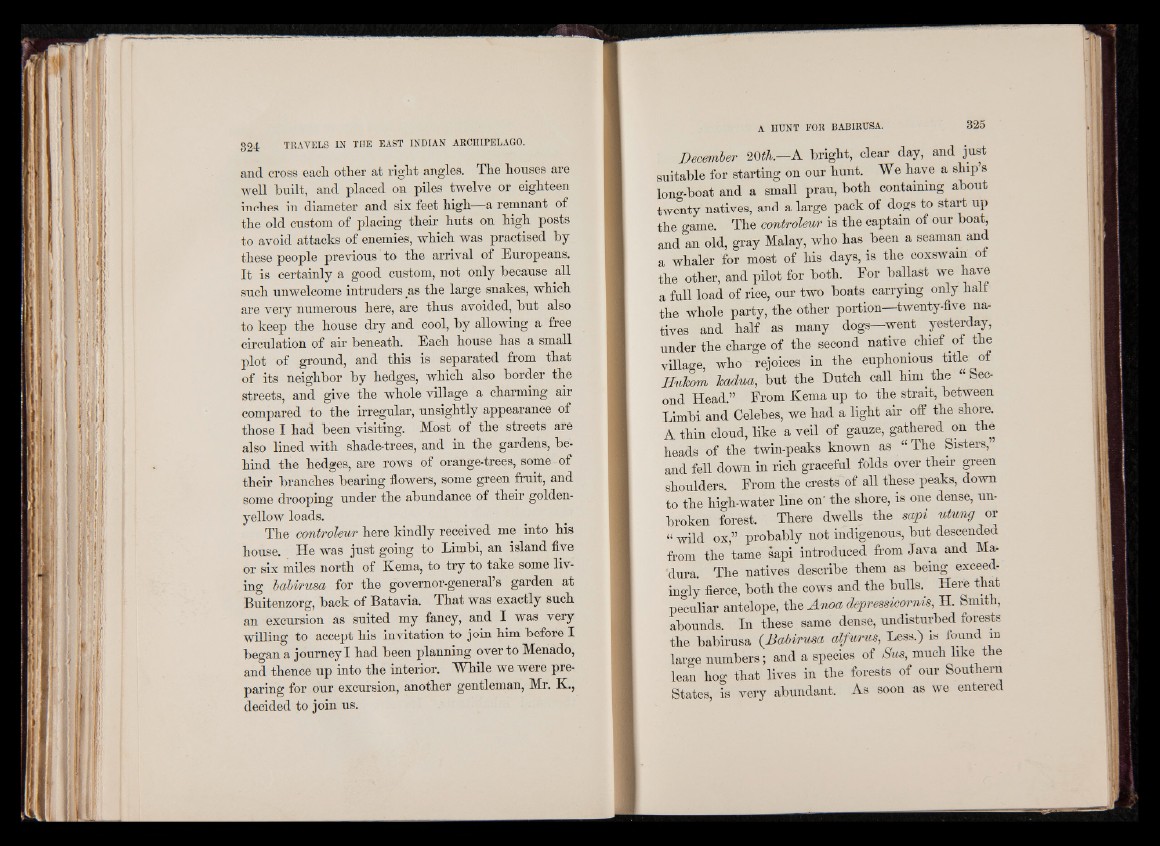
and cross each other at right angles. The houses are
well built, and placed on piles twelve or eighteen
inches in diameter and six feet high—a remnant of
the old custom of placing their huts on high posts
to avoid attacks of enemies, which was practised by
these people previous to the arrival of Europeans.
It is certainly a good custom, not only because all
such unwelcome intruders as the large snakes, which
are very numerous here, are thus avoided, but also
to keep the house dry and cool, by allowing a free
circulation of air beneath. Each house has a small
plot of ground, and this is separated from that
of its neighbor by hedges, which also border the
streets, and give the whole village a charming air
compared to the irregular, unsightly appearance of
those I had been visiting. Most of the streets are
also lined with shade-trees, and in the gardens, behind
the hedges, are rows of orange-trees, some of
their branches bearing flowers, some green fruit, and
some drooping under the abundance of their goldenyellow
loads.
The controlewr here kindly received me into his
house. He was just going to Limbi, an island five
or six miles north of Kema, to try to take some living
bdbirusd for the governor-general s garden at
Buitenzorg, back of Batavia. That was exactly such
an excursion as suited my fancy, and I was very
willing to accept his invitation to join him before I
began a journey I had been planning over to Menado,
and thence up into the interior. While we were preparing
for our excursion, another gentleman, Mr. K.,
decided to join us.
December 20th.—A bright, clear day, and just
suitable for starting on our hunt. We have a ship s
long-boat and a small prau, both containing about
twenty natives, and a large pack of dogs to start up
the game. The controlewr is the captain of our boat,
and an old, gray Malay, who has been a seaman and
a whaler for most of his days, is the coxswain ot
the other, and pilot for both. For ballast we have
a full load of rice, our two boats carrying only half
the whole party, the other portion—twenty-five nar
tives and half as many dogs—went yesterday,
under the charge of the second native ^ chief of the
village, who rejoices in the euphonious title of
HuTcom Jsddud, but the Dutch call him the Second
Head.” From Kema up to the strait, between
Limbi and Celebes, we had a light air off the shore.
A thin cloud, like a veil of gauze, gathered on the
heads of the twin-peaks known as “ The Sisters,
and fell down in rich graceful folds over their green
shoulders. From the crests of all these peaks, down
to the high-water line on' the shore, is one dense, unbroken
forest. There dwells the sapi utung or
“ wild ox,” probably not indigenous, but descended
from the tame sapi introduced from Java and Madura.
The natives describe them as being exceedingly
fierce, both the cows and the bulls. Here that
peculiar antelope, the Anoa depressicorrds, H. Smith,
abounds. In these same dense, undisturbed forests
the babirusa (Babirusa dlfurus, Less.) is found in
large numbers; and a species of Bus, much like the
lean hog that lives in the forests of our Southern
States, is very abundant. As soon as we entered